Bernard Ernest Witkin (often referred to as Bernie), was born May 22, 1904, in Holyoke, Massachusetts, the son of Russian Jewish immigrants. His family relocated to San Francisco when he was a child, and he later attended Polytechnic High School in San Francisco, entered the University of California at Berkeley in 1921, then studied law at Boalt Hall in 1925, and was awarded the LL.B. (Bachelor of Laws) degree in 1928.
Having grown up during the Great Depression and raised in poverty, hard work and purpose was instilled in him at a young age. From that childhood, Bernie cultivated a life filled with family, friends, and experiences, and built a legal career that was distinguished by the success of his legal works, notwithstanding his unconventional take on law—he disliked law school, was a practicing attorney for less than two years, and never held the position of a judge or law professor. From his humble beginnings, Bernie became the preeminent scholar of California law, and created an entirely new standard for legal education and judicial ethics in California.
Bernie’s dislike of law school was well known, and he reveled in it. With a twinkle in his eye, he often told people that he cut as many classes as he could manage, and said that he took from law school “nothing that was worth preserving.” In fact, he frequently remarked that he detested law school for its time-honored Socratic method of teaching, which he claimed dishonored Socrates, insulted students, and was wildly impractical.
While taking a bar review course, Bernie unwittingly started down the path that lead him to his illustrious legal career. He described the teacher of that course as “not gifted, not particularly well prepared, and in no way comparable to law professors”, and only interested in “concealing the law from us as the law school did.” His belief that bar review materials were, in his own words, preposterous, led him to create his own bar review course, by typing up his notes from the bar review course and then selling it to fellow students. These notes eventually became the first Summary of California Law, and set the foundations for future editions.
Upon graduating law school in 1928, he entered what he described as a “dying law office” in San Francisco, and, with little to do, he started revising and adding to his bar review notes. He bought a mimeograph machine, paper and ink, hired an assistance to cut the stencils, and was in business. The 1928 First Edition Summary of California Law was born and Bernie sold it to law student friends for $15 a copy.
The 300-page second edition of the Summary of California Law, described by Bernie as “much improved, with real book cloth binding,” came out in 1929. The third edition was published in 1932, and the fourth in 1934. Like the first edition, the second, third, and forth editions were all mimeographed and paid for out of pocket.
The first professionally printed edition of his Summary of California Law was the fifth edition, which came out in 1936, seven years after the first edition. The fifth edition shows the brilliance of Bernie’s work, which can be seen across all Witkin treatises: that he was able to take the law of a large, geographically dispersed and diverse state and making it approachable through synthesis, avoiding the long-windedness of legal encyclopedias and the often opinionated, biased views of shorter works. It also serves as an example of Bernie’s method of legal writing, which was to “write in plain, simple English, without legalese, without arcane Latin, and without footnotes.” Throughout his works, Bernie’s objective was to take lawyers and judges away from what he saw as repetitive reading of raw cases and toward the reading of treatises, law review articles, and other works of summary and synthesis.
Bernie’s impact on California law went beyond legal writing. He started the Center for Judicial Education and Research, which provides continuing education to California judges. Bernie was also an advisory member of the California Judicial Council, a frequent participant in both the California Judges Association and the California Supreme Court Historical Society. Additionally, the California Judicial College was renamed the B. E. Witkin Judicial College in his honor.
Symbolizing his unique place in California legal history, upon his death, Bernie is the only non-judicial figure to be given a memorial by the Chief Justice and other prominent Californians, which was published in the official case reporter, California Reports. He is so fundamental to California law that his works have been cited by the California Supreme Court and the Courts of Appeal innumerable times. The Witkin Legal Institute has also created the Witkin Award, which recognizes academic excellence in California law schools with the Witkin Award for Academic Excellence.
Bernie was also known for his good humor and attention grabbing antics. He had a knack for balancing various glassware on his head, and while at the wedding of a friends’ son, he shocked people who didn’t know him by “walking about through all the rooms with a glass of red wine on his head.”
In 1978, Bernie married Alba B. Pichetto Kuchman, and together they made tremendous philanthropic contributions to a variety of different causes. In 1982, they created the Bernard E. and Alba Witkin Charitable Trust. Since then, the foundation has donated several million dollars to over 200 charitable and community groups that serve children, the elderly, and the homeless.
To honor Bernie, the state Legislature passed Education Code §19328 in 1997 and renamed the State Law Library as the “Bernard E. Witkin State Law Library of California.” At the dedication ceremony in 1998 his portrait was officially unveiled, and now hangs in the library.
Bernie’s works include the Treatises on Civil Procedure, Evidence, and Criminal Law, the original California Rules on Appeal, the California Style Manual, and the Manual on Appellate Court Opinions, as well as his philanthropic work in creating the Foundation for Judicial Education which provides continuing education to California judges. Throughout this career, Bernie strived to make California law understandable to all and his work continues to be fundamental in helping people understand the law today.
Bernie passed away in Berkeley, California on December 23, 1995, at the age of 91.
All quotes are derived from 13 Cal.4th. 1265, a memorial service for Bernard E. Witkin held by the California Supreme Court.
Images from the Bernard E. Witkin Memorabilia Collection
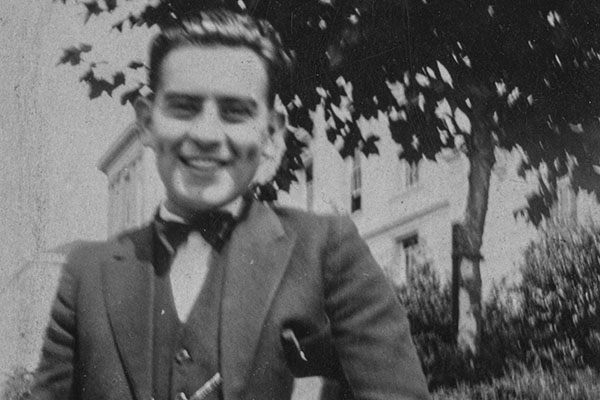
Taken in 1925, this was most likely during Bernie’s first year of law school at Boalt Hall, University of California, Berkeley.
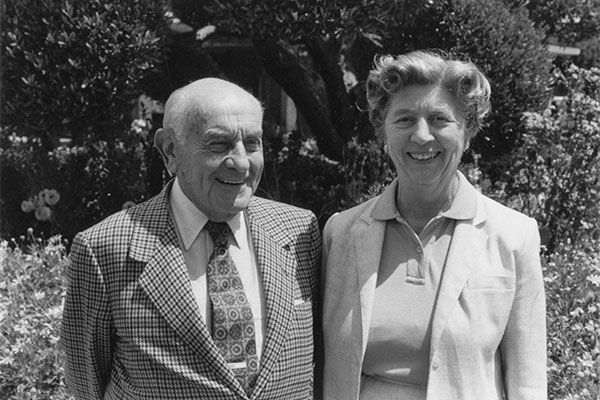
In 1978, Bernie married Alba B. Pichetto Kuchman, and together they created the Bernard E. and Alba Witkin Charitable Trust, which supports non-profit organizations that assist children in Alameda and Contra Costa Counties.
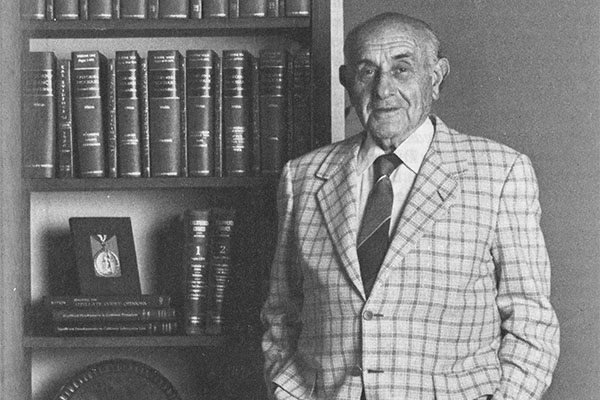
Bernie never tired of working, and continuously edited his works throughout his life. Seth Hufstedler related the following story:
Bernie said, “You know, Seth, I’m 80 this year. I’ve been thinking for some time that my books need rewriting. And so I’ve laid out a five-year program and I’m going to rewrite all of my books in the next five years.” It took exactly five years but he did rewrite all of his books. It shows the kind of dedication, the kind of energy, and the kind of enthusiasm that he had.
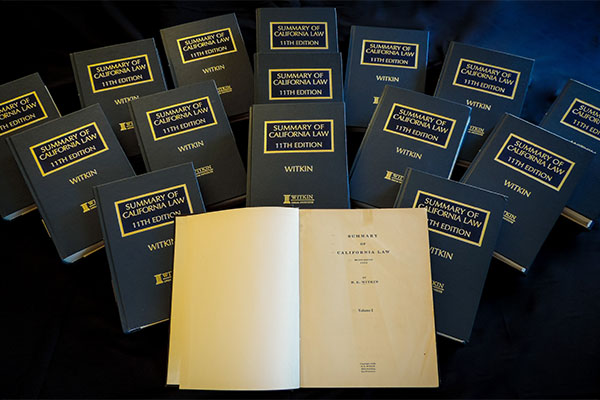
A side-by-side of the two volume second edition of Summary of California Law, printed in 1929, and the most recent edition, the eleventh edition, printed in 2017. The Summary of California Law has grown from one volume in the first edition to eighteen volumes in the eleventh edition.
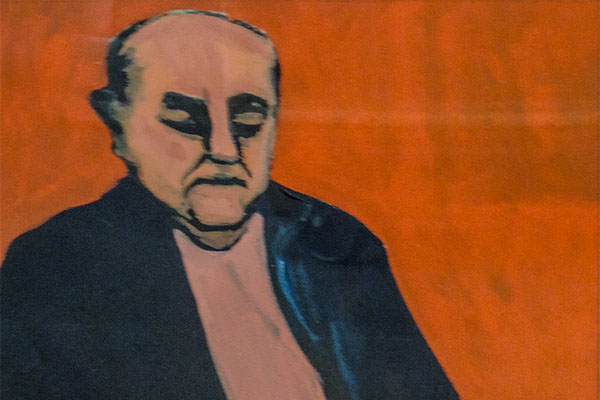
Bernard Witkin portrait by Alan Post.
Alan Post ran the non-partisan Legislative Analyst’s Office at the Capitol for 28 years, and was a friend of Bernie. At his memorial service, he remarked “Bernie was a beloved friend… a generous man… ever entertaining, ever interesting.”
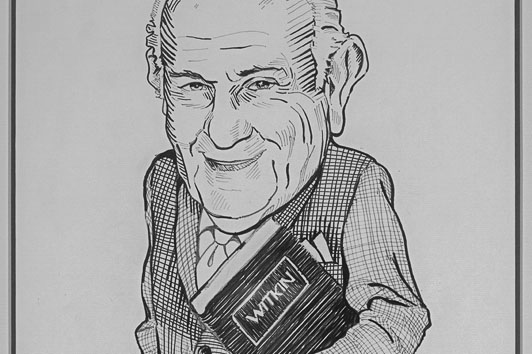
Not known for writing much poetry, Bernie authored and addressed this poem to the judiciary of California expressing his opinion of a recent decision:
Jurisdiction is a many splendored thing.
It makes the law do damned near anything.
It’s the legal system’s reason for being
the gimmick that makes each judge a king.
Once upon a high judicial hill,
seven judges huddled and had a spill.
Oh happy court, you’ve had your fling and jurisdiction’s now a many splintered thing.

